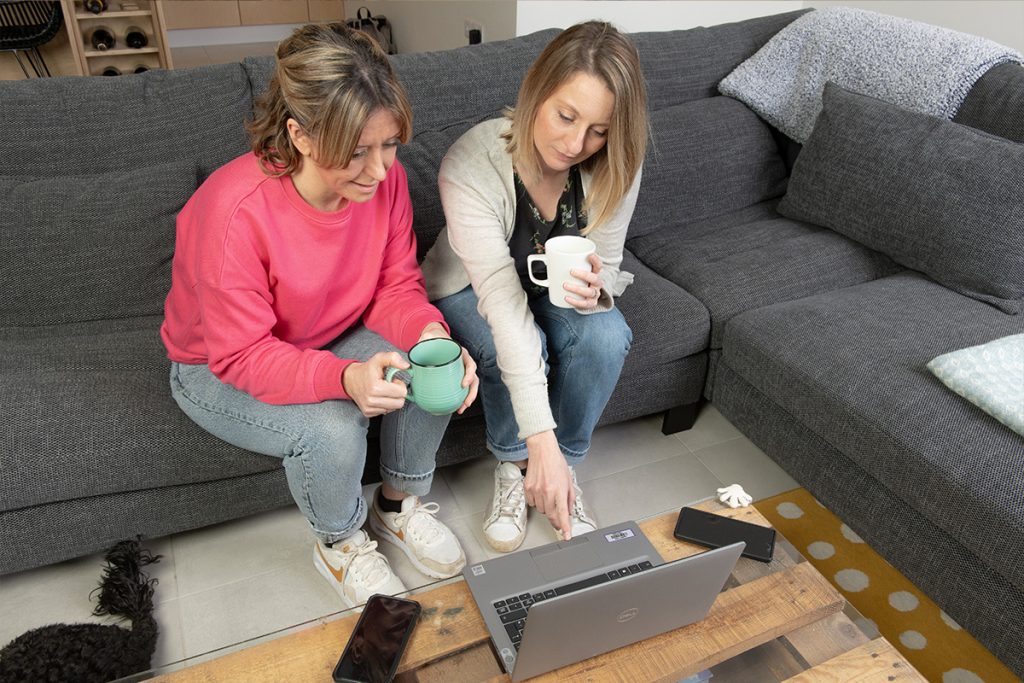The story of Mumie
Leave a CommentSarah and I met in 2018. We were introduced by a mutual colleague who thought we might have a lot in common, and with our first babies due within a couple of months of each other, could be new mum friends. And we were just that. Bleary eyed walks with babies in slings, the kind of conversations where you’re so tired that you’re not really having a conversation as neither of you know what you’re talking about. And coffee. Lots of it.
Fast-forward 3 years and with 4 babies between us, one morning in May 2021 Sarah called round after a baby class. I don’t remember if we were allowed to be indoors yet after COVID, or whether it was just a beautiful Devon day, but we sat metres apart one-inside-one-outside. Her little one soundly asleep in a buggy exhausted from an hour of clapping and singing and mine engaging in another mammoth cluster feed. She sat down and looked me straight in the eye.
“Do you want to make an app?” she asked. I thought she was joking at first. But then she started talking, full of passion to support women on their journey, suddenly thrust into this new role as “mum” without so much as a training day. As we delved deeper into the ups and downs of those tricky early months and all the questions and self doubt new mums might feel, it started to feel like this was something we really needed to do. We wondered if we, both with lots of experience as GPs and on our second babies, were still googling when our hair would stop falling out and why my caesarean section shelf was far worse the second time round, that perhaps other mums out there felt the same and were desperately seeking knowledge about their health and recovery, and validation that what they were experiencing was normal, or not.
So we set to work.

We know what standard postnatal care looks like from our work as GPs. The NICE guideline for postnatal care details the intensive support from midwifery services, a referral across to a health visitor, and a single GP visit at 6-8 weeks. We spoke to mums about what their real-world experiences looked like and there was a resounding message:
“Once standard postnatal care ends, you’re on your own”
With a falling number of health visitors and loss of the drop in support at a children’s centre new mums used to rely on, they told us they were turning to Google, provoking anxiety and uncertainty, or relying on their friends for advice. Many told us their emotional wellbeing had suffered as a result. There’s a lot of information and support about how to look after your baby, but not how to look after yourself as a new mum.
Current statistics show that 40% of women don’t attend their postnatal check. This said, this single check that takes place 6-8 weeks after the birth of your baby is the only formal routine contact that takes place with a GP after your baby is born. If you’re anything like me, you’re still in the utter chaos that is the fourth trimester and celebrating the fact you’ve managed to get yourself and baby to an appointment on time, remembered the red book and enough nappies for the 4th poonami of the day already, let alone remembering what you meant to ask the GP about in that single appointment. For most of us, 6-8 weeks is just too early to really have an idea of how we are recovering. Or even be aware of our own bodies and needs. It’s just too soon.
There’s an expectation amongst mums that we should just get on with it. That we’ve had a baby and this is our lot now. I’ve heard so many times “you have a beautiful healthy baby, this is all that matters.”
Is it though? Is it really all that matters?
Happy mum, happy baby
It’s widely recognised that for babies to thrive, the relationships and care first two years of their lives are critical. If a mum is not well, particularly relating to her mental health and emotional wellbeing, the attachment and bond she develops with her baby can be affected. It’s absolutely vital that to ensure the health and futures of our children that we need to start looking after ourselves as mums. For many of us, parenthood isn’t what we thought it would be. And that’s ok.
We need to change the narrative. Change that your baby is all that matters. You matter. And to be the best mum you can be, you need to be happy and healthy.
We recognise this, and so when Sarah sat down and asked if I wanted to make something with her, I said yes. We have a wonderful opportunity to build a community of mums who prioritise their health and wellbeing, talk about their mental health and not feel ashamed to admit if motherhood isn’t as wonderful and rosy as they imagined. Let’s not just assume now we have had babies that we can’t laugh without peeing ourselves, that our tummy muscles will never work again or that our hair is forever destined to clog the shower drain.
We owe it to ourselves and our families to be the best mums we can be. And not just the best at looking after our children. We know you’re already great at that.
It’s time to focus on you. Thank you for being part of it with us.
